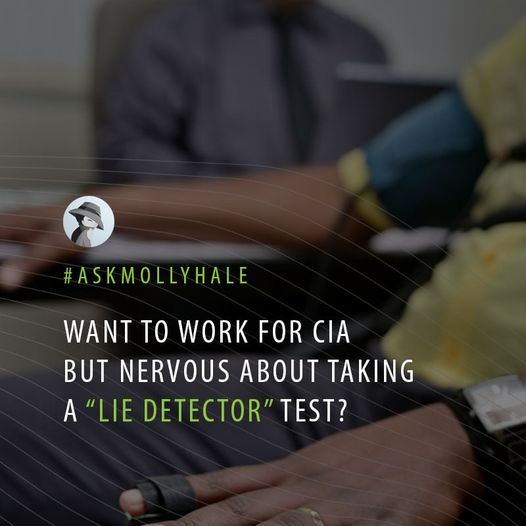Since 2002, the CIA has used the pseudonym “Molly Hale” to respond to selected public inquiries. Since 2019, such inquiries may be directed to the CIA’s Twitter or Facebook accounts using the hashtag #AskMollyHale.
On 3 March 2021, Molly Hale replied to the following inquiry:
Dear Molly,
I would really love to work for CIA, and think I would be a great candidate, but I’m nervous about taking a lie detector test. It’s not that I have anything to hide, I just feel like my results wouldn’t be accurate because of my crazy nerves! What do you recommend I do?
Nerves of Jello
Among other things, Molly Hale writes:
I’m here to tell you that the actual polygraph is far less intimidating than your mind might make it out to be. We’re talking less Jason Bourne and more Meet the Parents, if cinema is your thing. But seriously, the polygraph isn’t a strategy to ‘psych out’ potential officers….
This is a lie. The polygraph is precisely a strategy to psych out potential CIA officers. Specifically, it is intended to convince them that the polygraph operator can read their minds (lie detection is a form of mind reading), and that deception is futile. In fact, polygraphy has no scientific basis (it’s a century-old, cop-invented pseudoscience), and polygraph outcomes have no clear connection with whether one has spoken the truth.
In the pre-employment polygraph screening technique used by the CIA, applicants are typically accused of lying or withholding information during the initial polygraph session and are badgered for admissions. If no disqualifying admissions are made, they are typically invited back for one or more follow-up sessions.
Molly Hale continues:
…It is a tool, which is leveraged to assess a person’s strength of character, trustworthiness, honesty, and reliability; nothing more, nothing less. Given the access to sensitive information afforded to CIA officers, it is important we use every tool at our disposal to determine a person’s suitability for employment.
Ouija boards and astrological charts are also at the CIA’s disposal. Should they use these, too? Molly Hale goes on:
To your point about nerves affecting the outcome of the test, understand that CIA polygraph examiners are some of the world’s most capable security professionals. They are well-trained in the use of polygraph instruments and are skilled in properly assessing the results. That is to say, they know how to distinguish nerves from deception. If you’re concerned that the examiner might conflate the two, let me ease your worries: our examiners are incredibly good at what they do.
Molly Hale’s claim that CIA polygraph operators “know how to distinguish nerves from deception” is patently false. The fundamental weakness of polygraphy is that it cannot distinguish between people who are nervous because they are lying and those who are nervous but telling the truth.
In 2002, the National Academy of Sciences completed a thorough review of the scientific evidence on polygraph screening and concluded that “its accuracy in distinguishing actual or potential security violators from innocent test takers is insufficient to justify reliance on its use in employee security screening in federal agencies.”
The CIA is willfully ignoring the science on polygraphs.
Molly Hale has yet another lie to tell:
If I haven’t been up to this point, let me be very clear: if you want to work for CIA, don’t let a fear of the polygraph be the one reason that stops you. We’re not looking for perfect people, we’re looking for honest people. If you are candid and forthright through the process, the polygraph will not be an issue.
Many candid and forthright CIA applicants end up being falsely branded as liars and disqualified based on polygraph chart readings. (Some have shared their stories here.) In fact, retired CIA polygraph operator John F. Sullivan has opined that “an honest subject has no better chance than a dishonest subject of getting through the process.”
Molly Hale concludes:
So take a deep breath, calm your nerves, and submit that application!
Before you submit that application, we recommend that you educate yourself about the pseudoscientific means by which the CIA will pretend to assess your honesty and integrity. Our free book, The Lie Behind the Lie Detector, is a good starting point.

Your tax dollars hard at work!
Instead of ask Molly Hale, shouldn’t it have been #ask Aldrich Ames?
I was appointed by the Pentagon DOD to American Embassies Defense Attache. I had to go through evaluations at Quantico. The questions are deeply personal and intimate. A candidate is vetted because childhood circumstances could surface and interfere with one’s judgement in dire circumstances. I was honest but felt emotionally dissected. However, I passed with one negative comment which was a propensity towards naivete. I felt honored to be chosen to serve with CIA Col.John KIZIRIAN INF USAF PERFORMING RECONNAISSANCE ON RUSSIAN DIPLOMATS ENGAGED IN AIMING NUCLEAR MISSILES AT AMERICAN INTERESTS ABROAD.